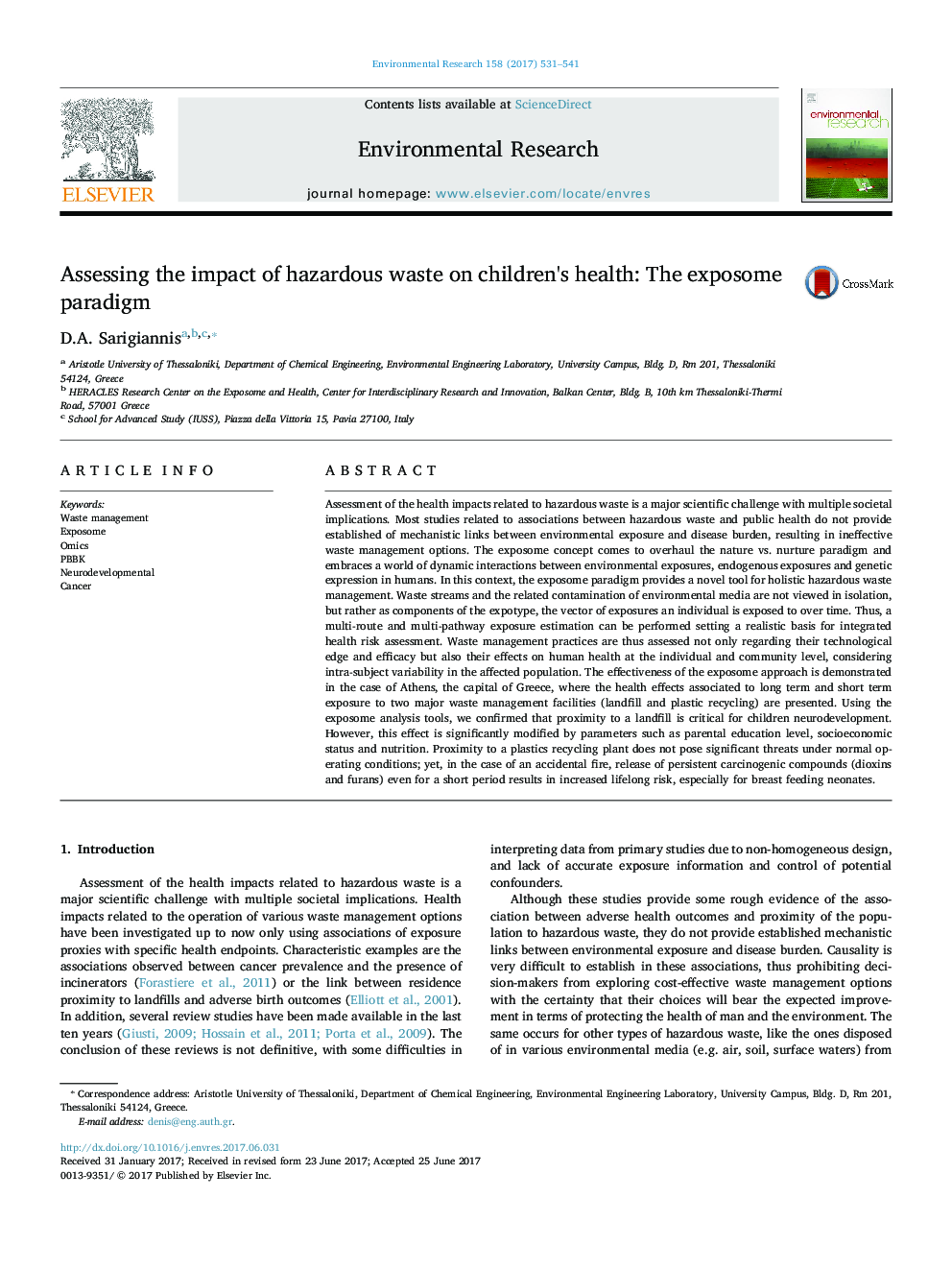| کد مقاله | کد نشریه | سال انتشار | مقاله انگلیسی | نسخه تمام متن |
|---|---|---|---|---|
| 5756378 | 1622545 | 2017 | 11 صفحه PDF | دانلود رایگان |
عنوان انگلیسی مقاله ISI
Assessing the impact of hazardous waste on children's health: The exposome paradigm
ترجمه فارسی عنوان
ارزیابی تاثیر زباله های خطرناک بر سلامت کودکان: پارادایم بازنمایی
دانلود مقاله + سفارش ترجمه
دانلود مقاله ISI انگلیسی
رایگان برای ایرانیان
کلمات کلیدی
ترجمه چکیده
ارزیابی تأثیرات بهداشتی مرتبط با زباله های خطرناک، یک چالش علمی بزرگ با پیامدهای چندگانه اجتماعی است. اغلب مطالعات مربوط به ارتباط بین زباله های خطرناک و بهداشت عمومی باعث ایجاد ارتباط بین مکانیسم بین آلودگی محیط زیست و بار بیماری، منجر به انتخاب گزینه های مدیریت ضایعات بی اثر می شود. مفهوم معرفتی به پارادایم طبیعت و پرورش احیای می پردازد و دنیایی از تعاملات پویا بین اثرات محیطی، قرار گرفتن در معرض درون زا و بیان ژنتیکی در انسان را در بر می گیرد. در این زمینه، پارادایم تجسمی یک ابزار جدید برای مدیریت زباله های خطرناک جامع فراهم می کند. جریانهای زباله و آلودگی مرتبط با محیط زیست به صورت جدایی ناپذیر مشاهده نمی شوند، بلکه به عنوان اجزای انحنای آن، بردار مواجهه فردی در طی زمان در معرض قرار می گیرد. بنابراین، یک ارزیابی مواجهه چند مسیری و چند مسیری را می توان با ایجاد یک مبنای واقعی برای ارزیابی ریسک یکپارچه سلامتی انجام داد. بدین ترتیب، شیوه های مدیریت زباله نه تنها بر لایه تکنولوژی و کارایی آنها تاثیر می گذارد، بلکه تاثیرات آنها بر سلامت انسان در سطح فردی و اجتماعی، با توجه به تغییرات درونی افراد در جمعیت تحت تأثیر قرار می گیرد. اثربخشی رویکرد معرفتی در مورد آتن، پایتخت یونان، نشان داده شده است که در آن اثرات بهداشتی مرتبط با قرار گرفتن در معرض بلند مدت و کوتاه مدت دو مرکز عمده مدیریت زباله (دفن زباله و بازیافت پلاستیک) ارائه شده است. با استفاده از ابزارهای تجزیه و تحلیل معرفت، ما تأیید کردیم که نزدیکی به دفن زباله برای توسعه عصبی کودکان مهم است. با این حال، این اثر به طور قابل توجهی با پارامترهایی مانند سطح تحصیلات والدین، وضعیت اجتماعی و اقتصادی و تغذیه اصلاح می شود. نزدیکی به یک کارخانه بازیافت پلاستیک در شرایط عملی عادی تهدید قابل توجهی نیست؛ با این حال، در صورت آتش سوزی اتفاقی، انتشار ترکیبات سرطان زایی پایدار (دیوکسین ها و فوران ها) حتی برای یک دوره کوتاه، باعث افزایش خطر ابتلا به طول عمر، به ویژه در نوزادان شیرده می شود.
موضوعات مرتبط
علوم زیستی و بیوفناوری
علوم محیط زیست
بهداشت، سم شناسی و جهش زایی
چکیده انگلیسی
Assessment of the health impacts related to hazardous waste is a major scientific challenge with multiple societal implications. Most studies related to associations between hazardous waste and public health do not provide established of mechanistic links between environmental exposure and disease burden, resulting in ineffective waste management options. The exposome concept comes to overhaul the nature vs. nurture paradigm and embraces a world of dynamic interactions between environmental exposures, endogenous exposures and genetic expression in humans. In this context, the exposome paradigm provides a novel tool for holistic hazardous waste management. Waste streams and the related contamination of environmental media are not viewed in isolation, but rather as components of the expotype, the vector of exposures an individual is exposed to over time. Thus, a multi-route and multi-pathway exposure estimation can be performed setting a realistic basis for integrated health risk assessment. Waste management practices are thus assessed not only regarding their technological edge and efficacy but also their effects on human health at the individual and community level, considering intra-subject variability in the affected population. The effectiveness of the exposome approach is demonstrated in the case of Athens, the capital of Greece, where the health effects associated to long term and short term exposure to two major waste management facilities (landfill and plastic recycling) are presented. Using the exposome analysis tools, we confirmed that proximity to a landfill is critical for children neurodevelopment. However, this effect is significantly modified by parameters such as parental education level, socioeconomic status and nutrition. Proximity to a plastics recycling plant does not pose significant threats under normal operating conditions; yet, in the case of an accidental fire, release of persistent carcinogenic compounds (dioxins and furans) even for a short period results in increased lifelong risk, especially for breast feeding neonates.
ناشر
Database: Elsevier - ScienceDirect (ساینس دایرکت)
Journal: Environmental Research - Volume 158, October 2017, Pages 531-541
Journal: Environmental Research - Volume 158, October 2017, Pages 531-541
نویسندگان
D.A. Sarigiannis,
